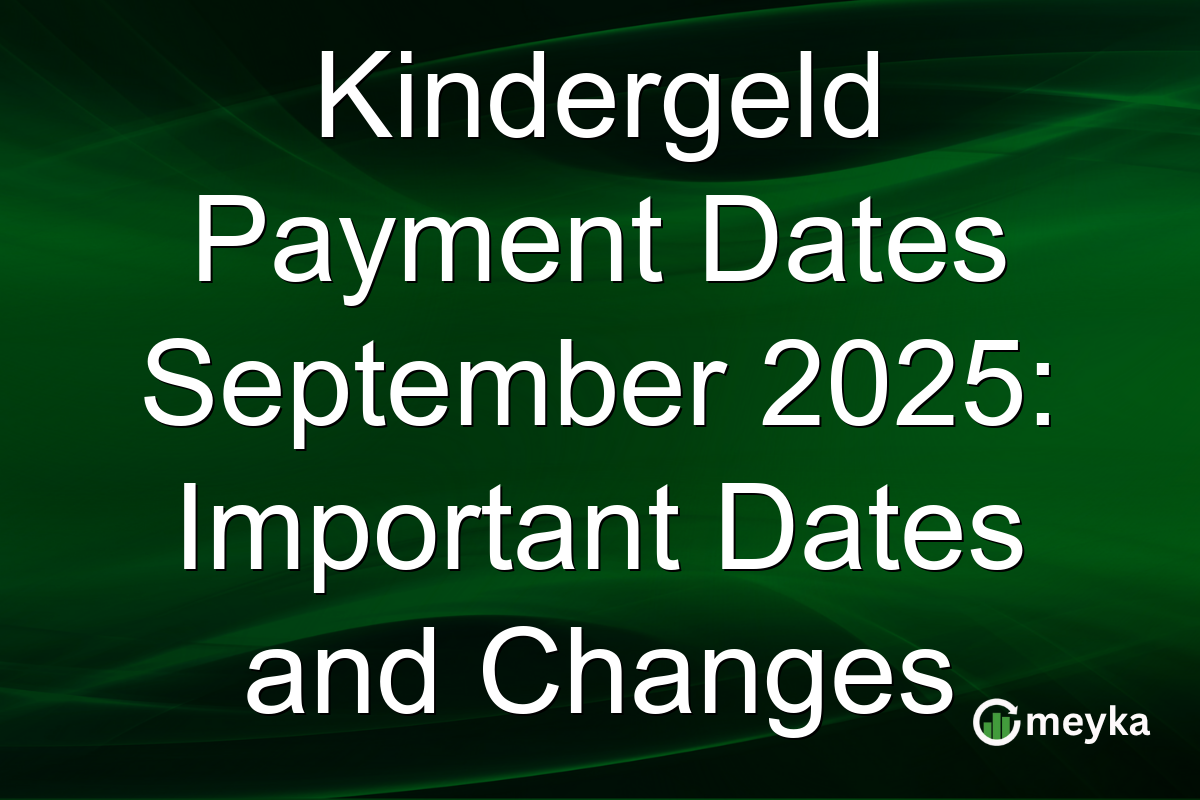Kindergeld Payment Dates September 2025: Important Dates and Changes
As September 2025 approaches, many families in Germany are eager to understand the details surrounding the Kindergeld payments. This essential child benefit has undergone some significant updates, and we’re here to break down the critical dates and changes. The monthly amount per child has increased to 255 euros, impacting many households positively. Understanding the specific payout schedule is crucial for proper planning, especially with the variations based on the last digit of the Kindergeld number.
Understanding the Kindergeld Payment Changes
In 2025, the Kindergeld payments have seen a notable increase, with the monthly support now set at 255 euros per child. This adjustment reflects the government’s effort to support families more effectively amidst rising living costs. According to the updates, this increase provides additional financial security to over seven million households across Germany. For those unfamiliar, Kindergeld is a benefit designed to ensure that families can adequately cover the costs of raising children. The enhancement is part of a broader family support strategy aimed at reducing the financial burdens on parents and guardians. It’s crucial for eligible families to be aware of these changes to maximize their benefits effectively. With the new amount fixed, families can plan their budgets more efficiently. This boost not only helps in meeting day-to-day expenses but also contributes to savings for future educational needs or other essential services. Keeping abreast of the payout schedule allows families to organize their finances in alignment with when they receive these funds.
September 2025 Payment Schedule
The Kindergeld payout schedule for September 2025 is structured based on the last digit of the Kindergeld number, ensuring a systematic and organized distribution. According to information from the Federal Employment Agency, this methodology helps manage the large volume of payments efficiently. Payments begin in the first week of September and are staggered throughout the month. For numbers ending in 0, payments start on September 1st. The schedule persists sequentially, with the last digit of 9 receiving payments towards the end of the month. This systematic approach ensures that families can predict their payment dates accurately, aiding them in timely financial planning. Being aware of these exact dates is critical as it eliminates confusion and helps in meticulous financial management. For many families, these payments are integral to managing monthly expenses, from groceries to educational costs.
Impacts of the Increased Kindergeld
The increase in the Kindergeld amount to 255 euros per child means substantial additional income for large families. For example, a family with three children will now receive 765 euros monthly, offering more flexibility in handling financial responsibilities. This increase aligns with the government’s commitment to assist families in battling inflation and rising costs of living. Long-term implications of this raise could also see an uptick in consumer spending, as families have extra disposable income to channel into other economic activities. It’s a potential stimulus for the economy, as more money spent by families helps boost local businesses and services. For parents, the increased funds provide an opportunity to save more diligently for their children’s future needs, such as higher education or extracurricular pursuits. Education, health, and welfare experts have welcomed this as a positive step towards strengthening the socio-economic fabric of the community.
Preparing for Future Kindergeld Adjustments
While the current increase is beneficial, it’s important for families to prepare for potential future adjustments. The government’s policy approach and economic conditions could influence further changes. Staying informed through reliable sources such as local government announcements and trusted financial news can keep recipients up-to-date. Analyzing how these funds contribute to family welfare helps in advocating for policy improvements. Tracking expenditure and savings from these payments can shed light on how households utilize financial benefits. Such data is pivotal for policymakers to understand and adjust benefits suitably. As September unfolds, families can look forward to these payments with a strategic approach. Implementing sound financial practices ensures they reap maximum benefits from available resources.
Final Thoughts
Understanding the Kindergeld payout schedule and the increased payment amount is vital for families. This knowledge allows them to manage their finances effectively and plan for short and long-term goals. Meyka, as a financial analysis resource, supports families by providing up-to-date information and strategic insights to help them optimize their financial decisions. As we navigate this period, thoughtful financial planning becomes more accessible with these crucial updates.
FAQs
From September 2025, each child will receive 255 euros per month as part of the Kindergeld payments, reflecting an increase to support families better.
Payment dates in September 2025 are determined by the last digit of the Kindergeld number, with different digits receiving payments throughout the month.
Families benefit by using the additional funds for daily expenses, savings for children’s education, and enhancing overall financial stability. It also boosts the economy by increasing consumer spending.
Disclaimer:
This is for information only, not financial advice. Always do your research.






